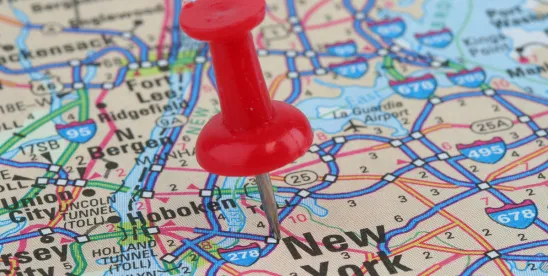New York City is on the verge of enacting a series of food delivery worker protection laws that are designed to provide improved working conditions for food delivery workers. Given that food delivery is such an integral part of City life, it is not surprising that these measures were put forward. The bills are expected to become law shortly.
The new laws consist of six bills, summarized in this GT Alert.
1. Availability of Toilet Facilities
One bill sets forth that food delivery applications (apps) must include a provision in contracts with restaurants requiring them to make their toilet facilities available for delivery workers’ use, as long as the delivery worker seeks to access the facilities while picking up a food or beverage order for delivery. However, a food establishment is not required to provide food delivery workers access to its toilet facility “[w]here accessing the toilet facility would require a food delivery worker to walk through such establishment’s kitchen, food preparation or storage area or utensil washing area to access such facility” or “[w]here accessing the toilet facility would create an obvious health and safety risk to the food delivery worker or to the establishment.”
2. Minimum Per-Trip Payments
Another bill sets up a process to establish minimum per-trip payments, which would be in addition to gratuities. Factors to be considered include “the duration and distance of the trip, the mode of transportation used by the worker and the associated expenses of operation, the type of trip, including the number of separate deliveries made along a route, the adequacy of third party delivery worker income considered in relation to expenses, and any other relevant factors.”
3. Distribution of Gratuities
Gratuities are also the subject of another bill. For each order placed on a food delivery platform such as a website or app, the food delivery app shall disclose (1) “the proportion or fixed amount of each gratuity that is distributed to the worker who delivered the goods purchased, including whether such gratuity is required to be shared with other workers,” (2) “[h]ow gratuities are distributed to delivery workers, whether immediately or otherwise, and in what form of payment, whether cash or otherwise,” and (3) “[t]he amount of each gratuity that is used to compose each delivery worker’s base wage.” Apps are required to credit gratuities to the worker and notify the worker if a gratuity was added, the amount, whether the customer removed it and why, if a reason was provided. Apps are also required to inform the delivery worker the total compensation and gratuities earned by that worker daily. The bill also requires that records be maintained for three years.
4. Regulation of Payments and Payment Schedule
Another bill prohibits charging delivery workers with fees for the payment of their wages and requires that delivery workers be paid at least once per week.
5. Limits on Personal Delivery Zones
A further bill requires food delivery apps and couriers to provide delivery workers with the opportunity to set delivery parameters: (i) a maximum distance per trip they will travel; and (ii) that the worker will not accept trips over bridges or tunnels. Apps or couriers cannot offer a worker trips inconsistent with the parameters or penalize a worker for their parameters by (1) “[r]educing or downgrading any public or internal rating of such worker,” (2) “[r]efusing or limiting access to the third-party food delivery service,” or (3) “[d]ecreasing the number of trips offered to such worker that are consistent with the parameters set by such worker.” Additionally, before a delivery trip, the delivery worker is to be provided with the address, estimated time and distance per trip, any gratuity, and compensation to be paid, excluding gratuity.
6. Provision of Insulated Bags
One other bill provides that a food delivery service must provide at its own expense or ensure the availability of an insulated food delivery bag for each of its bicycle operators. The food delivery service may not charge the delivery worker any money for such a bag.
Thus, food delivery companies and restaurants should review their practices and incorporate these laws into their policies.



 />i
/>i

